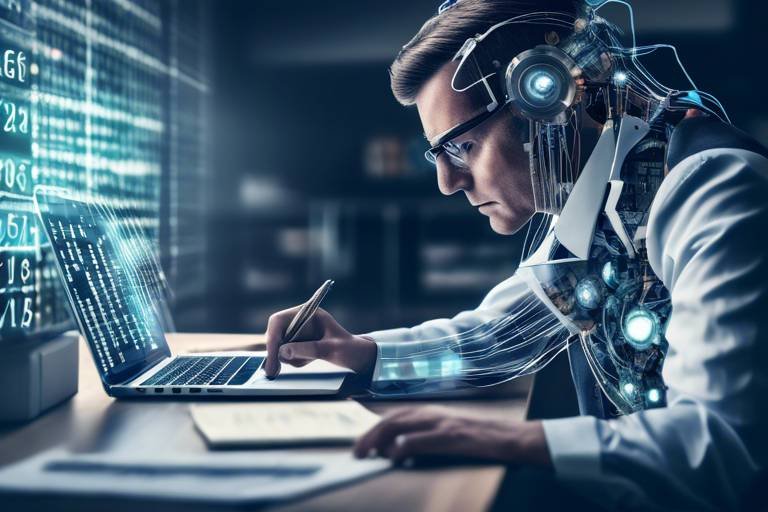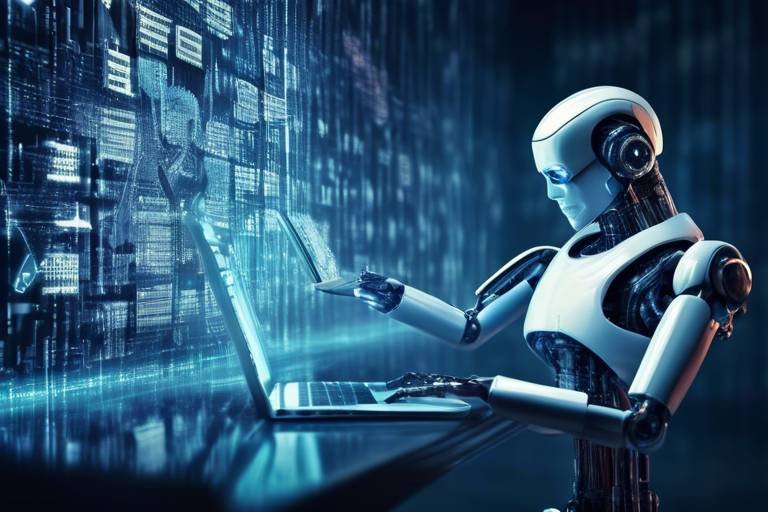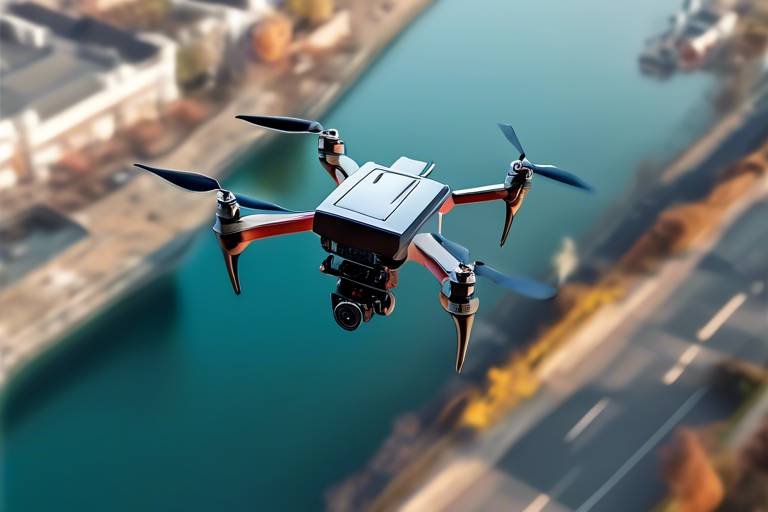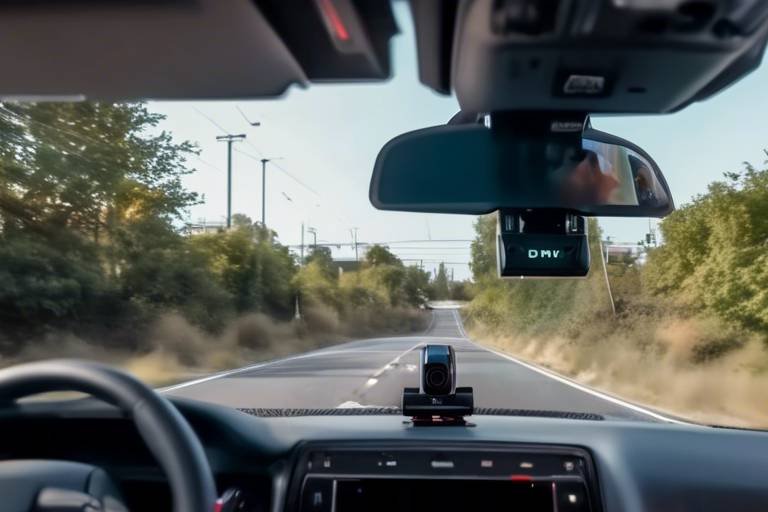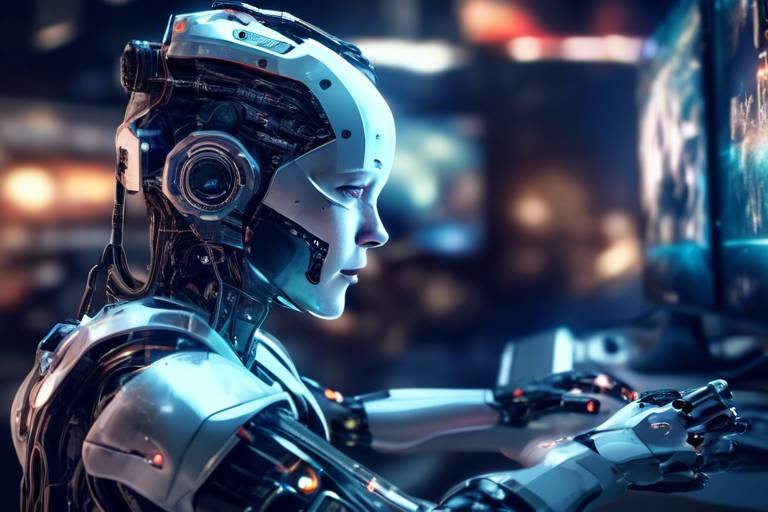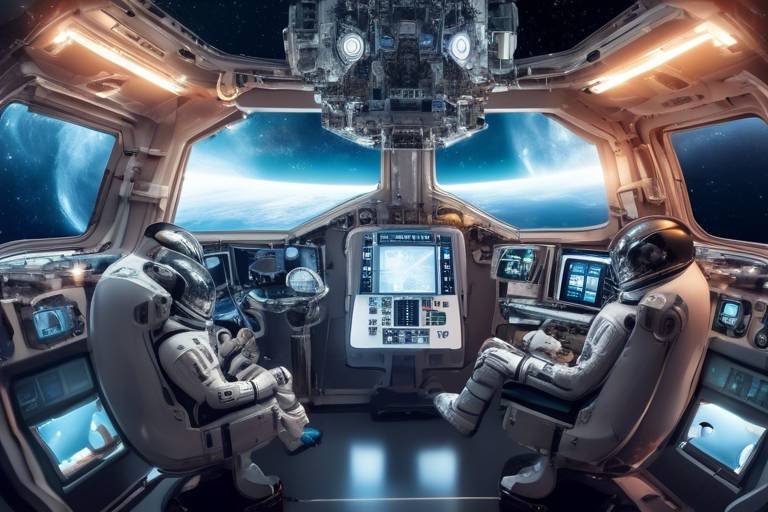Driving Customer Experiences: AI in the Hospitality Industry
In today's fast-paced world, customer expectations are soaring, and the hospitality industry is no exception. With the advent of artificial intelligence (AI), hotels, restaurants, and other service providers are embracing innovative technologies to enhance guest interactions and streamline operations. Imagine walking into a hotel where the staff already knows your name, preferences, and even your favorite pillow type. Sounds like a scene from a futuristic movie, right? Well, that future is now! AI is transforming the way we experience hospitality, making it more personalized and efficient than ever before.
But what exactly does AI bring to the table? To put it simply, AI acts as a powerful tool that leverages data-driven insights to improve customer service and operational efficiency. From chatbots that provide instant assistance to predictive analytics that forecast guest preferences, AI is reshaping the customer journey in remarkable ways. It’s like having a personal concierge available 24/7, ready to cater to your every need.
As we delve deeper into this fascinating topic, we will explore the various applications of AI in the hospitality sector. We’ll discuss how personalized guest experiences are being crafted through advanced technologies and how operational processes are being streamlined to enhance overall efficiency. So, whether you're a hotel manager looking to upgrade your services or a curious traveler eager to know what’s in store for your next vacation, you’re in the right place!
Artificial intelligence is not just a buzzword; it’s a game-changer for the hospitality industry. By integrating AI into their operations, businesses can harness the power of automation and data analysis to create seamless customer experiences. Think of it as having a personal assistant that not only understands your needs but also anticipates them. AI systems can analyze vast amounts of data, identifying trends and patterns that help businesses make informed decisions. This capability allows hospitality providers to tailor their services based on guest preferences, ensuring that every stay is memorable.
Moreover, AI can enhance customer service by streamlining communication channels. Imagine a world where you can book a table, order room service, or even request housekeeping through a simple text message or voice command. This level of convenience is becoming increasingly possible thanks to AI technologies. By integrating chatbots and virtual assistants into their systems, hotels and restaurants can provide 24/7 support to guests, answering queries and facilitating bookings with ease.
Personalization is the name of the game in today’s hospitality landscape. With AI, hotels and restaurants can analyze guest data to offer customized services that cater to individual preferences. For instance, if a guest frequently orders a specific dish or prefers a certain type of room, AI can ensure that these preferences are noted and acted upon during future visits. This level of attention to detail not only enhances customer satisfaction but also fosters loyalty. After all, who wouldn’t want to return to a place that remembers their favorite wine or the type of pillow they sleep best on?
One of the most exciting applications of AI in hospitality is the use of chatbots and virtual assistants. These digital helpers are revolutionizing customer service by providing instant responses to common inquiries and assisting with bookings. Imagine having a friendly assistant available at any hour of the day, ready to help you with anything from room reservations to local recommendations. This convenience not only enhances the guest experience but also improves operational efficiency by allowing staff to focus on more complex tasks.
Chatbots offer numerous benefits, including:
- Reduced Wait Times: Guests receive immediate responses, eliminating frustrating delays.
- 24/7 Availability: Assistance is available around the clock, catering to guests in different time zones.
- Enhanced Customer Experience: By addressing common inquiries efficiently, chatbots free up staff to provide personalized service.
While the benefits of chatbots are clear, there are challenges that must be addressed. Ensuring natural language processing accuracy is crucial, as guests expect seamless interactions. Additionally, managing complex customer interactions can be tricky, requiring a balance between automation and human touch to maintain service quality.
Q: How does AI improve customer service in hotels?
A: AI enhances customer service by providing instant assistance through chatbots, analyzing guest data for personalized experiences, and streamlining communication channels.
Q: What are the main benefits of using AI in hospitality?
A: Key benefits include improved operational efficiency, personalized guest experiences, and enhanced customer satisfaction through timely responses and tailored services.
Q: Are there any challenges associated with implementing AI in hospitality?
A: Yes, challenges include ensuring accurate natural language processing and managing complex customer interactions while maintaining service quality.

Understanding AI in Hospitality
Artificial intelligence (AI) has become a game-changer in the hospitality industry, transforming the way businesses operate and interact with their guests. By harnessing the power of data and automation, AI enables hotels, restaurants, and other hospitality services to streamline operations and enhance customer service. Imagine walking into a hotel where your preferences are already known, or dining at a restaurant where the menu is tailored just for you. This is not science fiction; it’s the reality that AI brings to the table.
At its core, AI in hospitality revolves around its ability to analyze vast amounts of data and derive actionable insights. This capability allows businesses to make informed decisions that improve both operational efficiency and guest satisfaction. For instance, AI can predict peak times for check-ins and manage staff schedules accordingly, ensuring that guests receive prompt service even during busy periods. Moreover, AI can assist in inventory management, predicting stock needs based on historical usage patterns and current trends, which minimizes waste and maximizes profitability.
One of the most significant advantages of AI is its ability to enhance the customer experience through personalized interactions. By analyzing guest data—such as previous stays, dining preferences, and feedback—AI can create tailored recommendations. For example, if a guest frequently orders vegetarian dishes, AI can suggest similar options or even offer discounts on those meals during their next visit. This level of personalization not only boosts customer satisfaction but also fosters loyalty, as guests feel valued and understood.
Furthermore, AI-powered chatbots and virtual assistants have revolutionized customer service in the hospitality sector. These tools provide 24/7 support, answering common inquiries and assisting with bookings, which significantly reduces wait times for guests. Imagine being able to book a room or make a dinner reservation at any hour of the day, simply by chatting with a virtual assistant. This convenience enhances the overall guest experience and allows human staff to focus on more complex tasks that require a personal touch.
However, the integration of AI is not without its challenges. Ensuring that AI systems understand natural language effectively is crucial for providing satisfactory customer interactions. If a chatbot misinterprets a guest's request, it can lead to frustration and a negative experience. Therefore, ongoing training and refinement of these AI systems are essential to maintain high standards of service.
In summary, understanding AI in hospitality is about recognizing its potential to transform guest interactions and streamline operations. As this technology continues to evolve, it will undoubtedly open new avenues for enhancing customer experiences, making the hospitality industry more efficient and guest-centric than ever before.

Personalized Guest Experiences
In today's fast-paced world, where every moment counts, the hospitality industry is stepping up its game by leveraging artificial intelligence to create that leave a lasting impression. Imagine walking into a hotel where the staff already knows your name, your favorite drink is waiting for you, and your room temperature is set to your preferred level. Sounds like a dream, right? Well, with AI, this dream is becoming a reality. By analyzing vast amounts of data, AI can help hotels and restaurants understand their guests on a deeper level, allowing them to tailor services that not only meet but exceed expectations.
How does this work? AI systems can track guest preferences and behaviors through various touchpoints, such as bookings, feedback, and social media interactions. For instance, if a guest frequently orders a specific dish or prefers a particular type of room, AI can use this data to make personalized recommendations during their next visit. This level of attention to detail not only enhances customer satisfaction but also fosters loyalty, turning first-time visitors into repeat guests.
One of the most exciting applications of AI in creating personalized experiences is the use of chatbots and virtual assistants. These digital helpers are available 24/7, answering queries and assisting with bookings at any hour. Imagine arriving at a hotel late at night and needing assistance; a chatbot can provide immediate support, ensuring that guests feel valued and cared for, regardless of the time. This instant interaction not only improves operational efficiency but also enhances the overall guest experience.
Chatbots are revolutionizing the way hospitality businesses interact with their customers. They can handle a multitude of tasks, from answering frequently asked questions to making reservations and even providing local recommendations. The best part? They do this without making guests wait. In an industry where time is of the essence, this capability is invaluable. Guests can receive instant responses to their inquiries, allowing them to focus on enjoying their stay rather than worrying about logistics.
Here are some of the key benefits that chatbots bring to the table:
- Reduced Wait Times: Chatbots provide immediate responses, drastically cutting down the time guests spend waiting for assistance.
- Increased Availability: With 24/7 support, guests can get help whenever they need it, enhancing their overall experience.
- Operational Efficiency: By automating routine tasks, staff can focus on more complex customer interactions, leading to better service.
While the benefits of chatbots are clear, implementing them effectively does come with its challenges. Ensuring that the natural language processing capabilities are accurate is crucial; guests should feel like they are having a conversation with a human rather than a robot. Additionally, managing complex customer interactions can be tricky. For instance, if a guest has a unique request that falls outside typical parameters, the chatbot must know when to escalate the issue to a human staff member. Overcoming these hurdles is essential for optimizing chatbot performance and maximizing guest satisfaction.
In summary, personalized guest experiences are no longer a luxury; they are an expectation. As hospitality businesses continue to embrace AI technologies, the ability to offer tailored services will only improve, creating unforgettable experiences that keep guests coming back for more.
Q: How does AI personalize guest experiences?
A: AI analyzes guest data, including preferences and behaviors, to tailor services and recommendations, enhancing satisfaction and loyalty.
Q: What role do chatbots play in the hospitality industry?
A: Chatbots provide 24/7 support, answering queries and assisting with bookings, which improves operational efficiency and guest interaction.
Q: What are the main challenges of implementing AI in hospitality?
A: Challenges include ensuring accurate natural language processing and effectively managing complex customer interactions.

Chatbots and Virtual Assistants
In today's fast-paced world, have become essential tools in the hospitality industry, transforming the way hotels and restaurants interact with their guests. Imagine walking into a hotel and being greeted by a friendly chatbot that knows your name and preferences—this is not just a futuristic dream; it’s a reality that many establishments are embracing. By leveraging artificial intelligence, these digital assistants provide a seamless experience, catering to guests' needs around the clock. Whether it's answering inquiries, facilitating bookings, or providing local recommendations, chatbots are designed to enhance guest satisfaction while streamlining operations.
One of the key advantages of chatbots is their ability to offer 24/7 customer support. Guests no longer have to wait for the front desk to open or for a staff member to become available. Instead, they can get instant responses to their questions at any time of the day or night. This level of accessibility not only improves the guest experience but also allows hotel staff to focus on more complex tasks that require a human touch. For instance, while a chatbot handles routine questions like check-in times or menu options, staff can dedicate their efforts to creating memorable experiences for guests, such as personalized greetings or special arrangements for celebrations.
Moreover, the integration of chatbots and virtual assistants into hospitality settings is a game-changer for operational efficiency. By automating repetitive tasks, these AI-driven tools reduce wait times and enhance overall service delivery. For example, a guest can quickly book a table at a restaurant or request room service through a simple chat interface. The convenience of having such services at their fingertips makes guests feel valued and appreciated, ultimately leading to increased loyalty and repeat business.
However, the implementation of chatbots is not without its challenges. A significant hurdle is ensuring that these AI systems can understand and process natural language effectively. Guests may phrase their questions in various ways, and a chatbot must be equipped to handle this diversity. Additionally, managing complex customer interactions can be tricky. For example, if a guest has a unique request or a problem that requires human intervention, the chatbot must be able to escalate the issue to a human staff member seamlessly. This balance between automation and human touch is crucial for maintaining high-quality customer service.
In summary, chatbots and virtual assistants are revolutionizing the hospitality industry by providing instant support and enhancing operational efficiency. As these technologies continue to evolve, we can expect even more innovative applications that will further enrich the guest experience. The future looks bright for hospitality businesses willing to embrace AI-driven solutions, paving the way for a more personalized and efficient service landscape.
- What are chatbots? Chatbots are AI-powered programs designed to simulate conversation with users, providing instant responses to queries and facilitating various tasks.
- How do chatbots improve customer service? By offering 24/7 support, reducing wait times, and automating routine inquiries, chatbots enhance the overall guest experience and free up staff for more complex tasks.
- What challenges do chatbots face? Ensuring accurate natural language processing and managing complex interactions are significant challenges in chatbot implementation.

Benefits of Chatbots
Chatbots are revolutionizing the way hospitality businesses interact with their guests, offering a range of benefits that enhance the overall customer experience. Imagine walking into a hotel and having your questions answered instantly, or making a reservation without waiting on hold. That's the magic of chatbots! They provide immediate assistance, which is crucial in a fast-paced environment like hospitality.
One of the most significant advantages of chatbots is their ability to reduce wait times for guests. Traditional customer service often involves long wait times, especially during peak hours. However, chatbots are available 24/7, ready to respond to queries at any time of day or night. This not only improves guest satisfaction but also allows human staff to focus on more complex tasks that require a personal touch.
Additionally, chatbots can handle a multitude of inquiries simultaneously. This capability means that whether it's answering questions about room availability, providing information about amenities, or assisting with booking changes, chatbots can do it all without breaking a sweat. This leads to a more efficient operation, where guests feel valued and heard, ultimately enhancing their loyalty to the brand.
Moreover, chatbots can be programmed to learn from interactions, meaning they become more intelligent over time. They can analyze past conversations to improve their responses, making them increasingly effective at addressing guest needs. This continuous improvement is crucial in a sector where customer expectations are constantly evolving.
Here are some additional benefits of implementing chatbots in hospitality:
- Cost-Effective: By automating routine inquiries, hotels can reduce labor costs and allocate resources more efficiently.
- Consistency: Chatbots provide consistent responses, ensuring that all guests receive the same level of service regardless of when they reach out.
- Data Collection: Chatbots can gather valuable data on guest preferences and behaviors, which can be used to enhance future marketing efforts and service offerings.
In summary, the integration of chatbots in the hospitality industry not only streamlines operations but also significantly enhances the guest experience. By providing instant responses, learning capabilities, and operational efficiency, chatbots are proving to be an invaluable asset for hotels and restaurants alike.
Q: How do chatbots improve customer service in hotels?
A: Chatbots provide instant responses to guest inquiries, reducing wait times and allowing human staff to focus on more complex issues.
Q: Are chatbots available 24/7?
A: Yes, chatbots operate around the clock, ensuring that guests can receive assistance at any time, day or night.
Q: Can chatbots learn from previous interactions?
A: Absolutely! Chatbots can analyze past conversations to improve their responses and become more effective over time.

Challenges in Implementation
Implementing AI in the hospitality industry is not without its hurdles. One of the most significant challenges is ensuring natural language processing (NLP) accuracy. When guests interact with chatbots or virtual assistants, they expect a seamless experience that mimics human conversation. However, AI systems can struggle with understanding nuances, slang, or context, leading to frustrating interactions. Imagine asking a chatbot about a specific dish, only to receive a generic response that misses the mark entirely. This can not only annoy customers but also diminish their trust in the technology.
Another challenge is managing complex customer interactions. While AI excels at handling straightforward queries, it can falter when faced with intricate issues that require human empathy and understanding. For instance, if a guest has a unique request or a complaint about their stay, a chatbot may not provide the personalized attention needed to resolve the situation. This is where the human element becomes crucial, as guests often prefer to speak with a knowledgeable staff member who can address their concerns directly.
Moreover, the integration of AI systems into existing infrastructure can be a daunting task. Many hospitality businesses operate with legacy systems that aren't designed to work with modern AI technologies. This can lead to compatibility issues, requiring significant investment in new software and training for employees. The transition period can be disruptive, affecting service quality and customer satisfaction.
To tackle these challenges effectively, hospitality businesses must invest in robust AI training and continually update their systems. It’s essential to create a balance between AI efficiency and human touch. By doing so, businesses can harness the power of AI while still providing the exceptional service that guests expect.
In summary, while AI offers tremendous potential to enhance customer experiences in hospitality, addressing these implementation challenges is crucial for success. Businesses must be prepared to navigate the complexities of AI technology, ensuring that it complements rather than replaces the human element of service.
- What are the main benefits of using AI in hospitality?
AI can enhance operational efficiency, provide personalized guest experiences, and streamline customer service through tools like chatbots.
- How can AI improve customer satisfaction?
By analyzing guest preferences and behaviors, AI can tailor recommendations and services, leading to a more satisfying experience.
- What challenges do hotels face when implementing AI?
Challenges include ensuring accurate natural language processing, managing complex interactions, and integrating AI with existing systems.
- Will AI replace human staff in hospitality?
While AI can handle many tasks, the human touch is irreplaceable for providing personalized service and addressing unique guest needs.

Data-Driven Decision Making
In today's fast-paced hospitality industry, has become more than just a trend; it's a necessity. With the power of artificial intelligence (AI), hotels and restaurants can harness vast amounts of data to make informed choices that directly impact customer satisfaction and operational efficiency. Imagine being able to sift through mountains of information—guest preferences, booking patterns, and seasonal trends—within seconds. That’s the magic of AI!
AI systems analyze data from various sources, such as customer feedback, social media interactions, and booking histories. This analysis allows hospitality businesses to spot patterns and trends that would be nearly impossible to identify manually. For instance, if a hotel notices an uptick in guests requesting vegan meal options, they can adjust their menu accordingly, ensuring that they meet customer demands effectively.
Moreover, AI can help in refining pricing strategies. By analyzing competitors' rates, occupancy levels, and even local events, AI tools can suggest optimal pricing that maximizes revenue while remaining attractive to potential guests. This dynamic pricing model not only boosts profitability but also enhances customer satisfaction by ensuring competitive rates.
Another fascinating aspect of data-driven decision making is its impact on marketing strategies. AI can segment customers based on their preferences and behaviors, allowing for targeted marketing campaigns that resonate with specific audiences. For example, a hotel might send personalized emails to guests who previously stayed during the summer, offering them a special discount for their next summer getaway. This level of personalization fosters loyalty and encourages repeat business.
To illustrate the effectiveness of data-driven decision making in hospitality, consider the following table:
| Data Source | Insights Gained | Action Taken |
|---|---|---|
| Customer Feedback | Increased requests for gluten-free options | Updated menu to include gluten-free dishes |
| Booking Patterns | Peak bookings during local festivals | Implemented special festival packages |
| Social Media Engagement | High engagement on posts about spa services | Launched a spa promotion campaign |
As you can see, each data point leads to actionable insights that can significantly enhance the overall guest experience. However, it’s essential to remember that while AI can provide valuable information, the human element remains irreplaceable. Hospitality is about creating memorable experiences, and the best decisions often come from a blend of data analysis and human intuition.
In conclusion, data-driven decision making powered by AI is revolutionizing the hospitality industry. By leveraging data insights, businesses can not only improve their operational efficiency but also create personalized experiences that keep guests coming back for more. It’s a win-win situation that highlights the transformative potential of technology in our everyday interactions.
- How does AI improve customer satisfaction in hospitality?
AI enhances customer satisfaction by providing personalized experiences, optimizing service delivery, and ensuring that guest preferences are anticipated and met. - Can small hotels benefit from AI?
Absolutely! Small hotels can utilize AI tools for data analysis, marketing strategies, and operational efficiencies, leveling the playing field with larger competitors. - What are the challenges of implementing AI in hospitality?
Challenges include the initial investment, the need for staff training, and ensuring data privacy and security.

Enhancing Operational Efficiency
In the fast-paced world of hospitality, operational efficiency isn't just a buzzword; it's a necessity. With the rise of artificial intelligence (AI), hotels and restaurants can significantly streamline their operations, leading to improved service delivery and cost savings. Imagine a scenario where every aspect of a business runs like a well-oiled machine, with minimal human intervention. This is the promise that AI brings to the table. By automating mundane tasks, businesses can redirect their focus towards enhancing the guest experience.
One of the standout features of AI is its ability to optimize various operational processes. For instance, take inventory management. Traditionally, keeping track of stock levels was a labor-intensive task, often leading to overordering or stockouts. However, AI systems can analyze historical data and trends to predict inventory needs accurately. This means that hotels and restaurants can maintain optimal stock levels without the risk of waste. The result? A more sustainable business model that not only saves costs but also contributes to environmental conservation.
Moreover, staff scheduling can be a logistical nightmare, especially during peak seasons. AI-powered scheduling tools can analyze data such as guest bookings, historical occupancy rates, and even local events to forecast demand. This allows managers to create staff schedules that align with guest needs, ensuring that service levels are consistently high. By automating this process, businesses not only enhance employee satisfaction—because no one enjoys being overworked or underutilized—but also ensure that customers receive timely and attentive service.
| Operational Area | AI Application | Benefits |
|---|---|---|
| Inventory Management | Predictive analytics | Minimized waste, cost savings |
| Staff Scheduling | Automated scheduling tools | Optimized staffing, improved employee satisfaction |
| Guest Interaction | Chatbots and virtual assistants | 24/7 support, enhanced guest experience |
But the benefits of AI in enhancing operational efficiency extend beyond just inventory and scheduling. Consider the impact on guest interactions. With the implementation of chatbots and virtual assistants, hospitality businesses can offer round-the-clock support. Guests can have their questions answered instantly, whether it’s about room service, local attractions, or even booking modifications. This not only improves the overall customer experience but also frees staff to handle more complex inquiries that require a human touch.
In conclusion, the integration of AI into operational processes within the hospitality industry is a game-changer. By automating routine tasks and providing data-driven insights, businesses can enhance their efficiency, reduce costs, and ultimately create a better experience for guests. As we continue to embrace technology, the potential for operational excellence in hospitality is boundless.
- How does AI improve inventory management in hospitality? AI uses historical data to predict inventory needs, reducing waste and ensuring that businesses are well-stocked.
- What are the benefits of AI in staff scheduling? AI optimizes staff shifts based on demand forecasts, enhancing employee satisfaction and ensuring service levels meet customer expectations.
- Can chatbots really enhance customer service? Yes! Chatbots provide 24/7 support, answering common inquiries instantly, which improves guest interactions and overall satisfaction.

Smart Inventory Management
In the bustling world of hospitality, is like having a finely tuned engine that keeps everything running smoothly. With the integration of AI technologies, hotels and restaurants can now predict their inventory needs with remarkable accuracy. Imagine walking into a hotel kitchen where every ingredient is perfectly stocked, and not a single item goes to waste. This is the magic of AI-driven inventory systems!
AI systems use historical data and trends to forecast what items will be needed and when. This capability not only ensures that establishments are well-stocked but also minimizes the chances of overordering. For instance, a hotel might analyze past guest preferences during peak seasons, adjusting their inventory accordingly. This data-driven approach can lead to significant cost savings and increased profitability. It's like having a crystal ball that tells you exactly what you need to prepare for your guests!
Let's break down how smart inventory management works in practice:
| Feature | Description |
|---|---|
| Demand Forecasting | AI analyzes past sales data to predict future inventory needs. |
| Automated Reordering | Systems can automatically place orders when stock levels reach a predefined threshold. |
| Waste Reduction | By accurately predicting needs, businesses can reduce food and supply waste significantly. |
| Cost Efficiency | Minimizing overstock and waste leads to lower operational costs. |
This table illustrates just a few of the features that make AI-driven inventory management a game-changer in the hospitality industry. With these tools, businesses can not only keep their shelves stocked but also create a more sustainable operation. The reduction of waste not only saves money but also contributes to a greener planet, which is something that today's eco-conscious consumers appreciate.
Furthermore, the implementation of smart inventory management systems encourages collaboration among staff. When everyone is on the same page regarding stock levels and needs, it fosters a sense of teamwork and accountability. Employees can focus more on providing exceptional service rather than worrying about running out of essential supplies. It’s a win-win situation!
In conclusion, embracing AI for smart inventory management is not just about keeping track of supplies; it's about transforming the entire operational framework of hospitality establishments. This innovative approach leads to greater efficiency, reduced costs, and ultimately, a more satisfying experience for guests. So, the next time you enjoy a beautifully prepared meal at a restaurant or a perfectly stocked hotel room, remember that behind the scenes, AI is working tirelessly to make it all happen.
- How does AI improve inventory management in hospitality? AI analyzes data to predict inventory needs, helping businesses avoid overstocking and waste.
- Can AI systems automate ordering processes? Yes, many AI inventory systems can automatically reorder supplies when they hit a certain threshold.
- What are the benefits of reducing waste in hospitality? Reducing waste leads to cost savings, improved sustainability, and a better reputation among eco-conscious consumers.
- Is implementing AI for inventory management expensive? While there may be initial costs, the long-term savings and efficiency gains often outweigh the investment.

Staff Scheduling Automation
In the fast-paced world of hospitality, is a game-changer. Imagine a scenario where hotel managers no longer spend hours juggling schedules, trying to accommodate last-minute requests or unexpected absences. Instead, AI-driven tools can take over this daunting task, allowing managers to focus on what really matters: enhancing the guest experience. By analyzing historical data, these tools can predict peak times and adjust shifts accordingly, ensuring that the right number of staff is available when needed the most.
One of the key benefits of staff scheduling automation is its ability to improve employee satisfaction. When schedules are optimized based on demand forecasts, employees are less likely to experience burnout from overwork or frustration from inconsistent hours. This leads to a more motivated workforce, which directly translates to better service for guests. Happy employees equal happy customers! Furthermore, automated systems can also consider employee preferences and qualifications, creating a more balanced and fair scheduling process.
To illustrate the effectiveness of staff scheduling automation, consider the following table that compares traditional scheduling methods with automated systems:
| Aspect | Traditional Scheduling | Automated Scheduling |
|---|---|---|
| Time Spent | Hours of manual adjustments | Minutes with AI assistance |
| Employee Satisfaction | Often low due to inconsistent hours | Higher due to optimized shifts |
| Operational Efficiency | Can be chaotic and reactive | Proactive and data-driven |
| Response to Absences | Slow and cumbersome | Immediate adjustments |
However, it's essential to acknowledge that the transition to automated scheduling isn't without its challenges. For instance, while these systems can significantly reduce the time spent on scheduling, they require an initial investment in technology and training. Additionally, there may be some resistance from staff who are accustomed to traditional methods. To overcome these hurdles, it's crucial for management to communicate the benefits clearly and provide adequate training to ensure everyone is on board.
In conclusion, is not just a trend; it’s a necessity in the modern hospitality landscape. By embracing this technology, businesses can enhance operational efficiency, improve employee satisfaction, and ultimately provide a better experience for guests. As we move forward, the integration of AI into scheduling processes will undoubtedly become more sophisticated, paving the way for a more responsive and dynamic hospitality industry.
- What is staff scheduling automation?
Staff scheduling automation refers to the use of technology, particularly AI, to create and manage employee schedules efficiently, reducing manual effort and improving operational efficiency.
- How does AI improve staff scheduling?
AI analyzes historical data and predicts staffing needs based on various factors, optimizing schedules to ensure adequate coverage during peak times without overstaffing during slower periods.
- What are the benefits of automated scheduling?
Benefits include improved employee satisfaction, reduced scheduling time, enhanced operational efficiency, and the ability to respond quickly to unexpected absences.
- Are there any challenges to implementing automated scheduling?
Challenges may include initial costs, training needs, and potential resistance from staff who are accustomed to traditional scheduling methods.

Future Trends in AI and Hospitality
As we look to the future, the intersection of artificial intelligence and the hospitality industry promises to unveil a tapestry of innovative experiences that will redefine how guests interact with hotels and restaurants. With the rapid pace of technological advancement, we can anticipate a wave of trends that will not only enhance customer engagement but also streamline operations significantly. Imagine walking into a hotel where your preferences are already known, or dining at a restaurant where the menu is tailored to your dietary preferences and past orders. Sounds like something out of a sci-fi movie, right? Well, it's closer than you think!
One of the most exciting developments on the horizon is the integration of augmented reality (AR) into the hospitality experience. Picture this: you arrive at a hotel, and instead of a mundane check-in process, you’re greeted by an AR interface that offers you a virtual tour of your room and its amenities. This immersive experience not only sets the tone for your stay but also allows guests to explore their surroundings in a more engaging way. Hotels could offer interactive features like virtual concierge services, where guests can learn about local attractions, restaurant recommendations, and even book services—all from the comfort of their smartphones.
Another trend that’s gaining momentum is the use of machine learning for predictive analytics. This technology dives deep into guest data, analyzing patterns and behaviors to forecast future preferences. For example, if a guest frequently orders vegan meals during their stays, machine learning algorithms can suggest similar dining options or even curate a special menu just for them. This level of personalization not only enhances the guest experience but also boosts customer loyalty, as guests feel valued and understood.
Moreover, as the hospitality sector continues to embrace AI, we can expect the emergence of advanced analytics tools that will empower businesses to make data-driven decisions. From optimizing pricing strategies based on demand forecasts to customizing marketing campaigns that resonate with target audiences, these tools will be essential for staying competitive in a rapidly changing market. Imagine a hotel that can adjust its rates in real-time based on local events or seasonal trends, ensuring maximum occupancy and revenue.
It's also worth noting that as these technologies evolve, the hospitality industry will need to focus on addressing potential challenges. For instance, while the benefits of AI are clear, there will be a pressing need to ensure data privacy and security. Guests must feel confident that their personal information is protected, and businesses will need to implement robust systems to safeguard against breaches.
In summary, the future of AI in hospitality is bright and full of possibilities. As we embrace these trends, the key will be to balance technological advancements with the human touch that makes hospitality truly special. After all, while AI can enhance experiences, it’s the genuine connections and memorable interactions that will keep guests coming back for more. Are you ready to step into a new era of hospitality?
- What is the role of AI in enhancing customer experiences in hospitality?
AI plays a crucial role by personalizing guest experiences, streamlining operations, and providing data-driven insights that help businesses make informed decisions. - How does augmented reality improve guest experiences?
Augmented reality offers immersive experiences, such as virtual tours and interactive features, enhancing guest engagement and satisfaction. - What are the benefits of using machine learning in hospitality?
Machine learning helps predict guest preferences and behaviors, allowing businesses to tailor their offerings and marketing strategies effectively. - What challenges might hospitality businesses face when implementing AI?
Challenges include ensuring data privacy, managing complex customer interactions, and achieving accuracy in natural language processing for chatbots.

Augmented Reality Experiences
Imagine walking into a hotel room and instantly being greeted by a virtual concierge, ready to assist you with anything you need. Augmented reality (AR) is not just a buzzword; it’s transforming the way guests interact with their surroundings in the hospitality industry. By overlaying digital information onto the real world, AR creates immersive experiences that engage guests like never before. From virtual tours of the property to interactive in-room entertainment, the possibilities are endless.
One of the most exciting applications of AR in hospitality is the ability to offer interactive tours. Guests can use their smartphones or AR glasses to explore the hotel or resort, discovering hidden gems and amenities that they might otherwise overlook. Imagine pointing your device at a piece of art in the lobby and instantly receiving information about the artist and the story behind the piece. This not only enhances the guest experience but also adds a layer of personalization that can make their stay unforgettable.
In addition to enhancing physical spaces, AR can also revolutionize in-room experiences. Hotels can provide guests with virtual entertainment options, such as games or augmented reality experiences that allow them to interact with their environment in fun and engaging ways. For instance, a family could enjoy a virtual scavenger hunt around their room, uncovering clues and completing challenges that lead to rewards, such as discounts at the hotel’s restaurant or spa.
The integration of AR technology also allows for tailored marketing strategies. By analyzing guest interactions with AR features, hotels can gather valuable data on preferences and behaviors. This information can be used to create personalized marketing campaigns, ensuring that guests receive offers and recommendations that truly resonate with their interests.
However, implementing AR in hospitality is not without its challenges. The technology requires significant investment in infrastructure and staff training. Additionally, ensuring that the AR experiences are user-friendly and accessible to all guests, regardless of their tech-savviness, is crucial. Hotels must strike a balance between innovation and practicality to ensure that the technology enhances rather than complicates the guest experience.
As we look to the future, it’s clear that augmented reality will play a pivotal role in shaping the hospitality landscape. By embracing this technology, hotels and restaurants can create memorable experiences that not only attract guests but also foster loyalty. In a world where customer expectations are constantly evolving, those who leverage AR effectively will stand out in a crowded market.
- What is augmented reality in hospitality?
Augmented reality (AR) in hospitality refers to the use of digital information, such as images and sounds, overlaid on the real-world environment to enhance guest experiences. - How can AR improve guest experiences?
AR can provide interactive tours, personalized entertainment, and engaging marketing strategies, making stays more memorable and enjoyable. - Are there challenges to implementing AR in hotels?
Yes, challenges include the cost of technology, staff training, and ensuring user-friendliness for all guests. - What are some examples of AR applications in hospitality?
Examples include virtual tours of hotel amenities, interactive in-room entertainment, and augmented reality scavenger hunts.

Machine Learning for Predictive Analytics
In the fast-paced world of hospitality, understanding guest behavior is essential for delivering exceptional experiences. This is where machine learning comes into play, acting as a powerful ally for hotels and restaurants. By harnessing the vast amounts of data generated from customer interactions, machine learning algorithms can identify patterns and trends that would otherwise go unnoticed. Imagine being able to predict what your guests want before they even ask for it—this is the magic of predictive analytics in action.
Machine learning analyzes various data points, such as booking history, preferences, and even social media interactions, to create a comprehensive profile of each guest. For instance, if a guest frequently orders vegan meals during their stays, the system can flag this preference and suggest similar dishes or even notify the kitchen ahead of time. The result? A personalized experience that not only delights the guest but also fosters loyalty.
Furthermore, machine learning can enhance marketing strategies by predicting which promotions will resonate most with specific customer segments. By analyzing past campaign performance and customer responses, hotels can tailor their marketing efforts to maximize engagement and conversion rates. This level of customization is invaluable, especially in an industry where guest satisfaction directly impacts success.
To illustrate the power of machine learning in predictive analytics, consider the following table, which outlines potential applications and their benefits:
| Application | Description | Benefits |
|---|---|---|
| Guest Preference Prediction | Analyzes past behaviors to anticipate future needs. | Enhanced personalization, increased satisfaction. |
| Dynamic Pricing | Adjusts room rates based on demand forecasts. | Maximized revenue, optimized occupancy rates. |
| Targeted Marketing Campaigns | Identifies customer segments for tailored promotions. | Higher engagement, improved conversion rates. |
However, while machine learning offers exciting possibilities, it’s important to remember that data privacy and ethical considerations must be prioritized. Guests should feel confident that their information is being handled responsibly and transparently. Establishing trust is key to leveraging these advanced technologies effectively.
In summary, machine learning for predictive analytics is not just a trend; it’s a transformative approach that empowers the hospitality industry to anticipate and meet guest needs proactively. As hotels and restaurants continue to embrace this technology, the potential for creating unforgettable guest experiences will only grow.
Q1: How does machine learning improve customer experiences in hospitality?
A1: Machine learning analyzes guest data to predict preferences and behaviors, allowing businesses to tailor their services and marketing efforts, ultimately enhancing customer satisfaction.
Q2: What types of data are used in machine learning for predictive analytics?
A2: Data can include booking history, dining preferences, social media interactions, and feedback from previous stays, which all contribute to creating a comprehensive guest profile.
Q3: Are there any risks associated with using machine learning in hospitality?
A3: Yes, data privacy and ethical considerations are critical. Businesses must ensure they handle guest data responsibly to maintain trust and comply with regulations.
Frequently Asked Questions
- What is the role of AI in the hospitality industry?
AI plays a transformative role in the hospitality industry by streamlining operations and enhancing customer service. It leverages data-driven insights to improve guest interactions and optimize various processes, allowing businesses to provide personalized experiences.
- How does AI personalize guest experiences?
AI personalizes guest experiences by analyzing preferences and behaviors. This analysis enables hotels and restaurants to offer tailored recommendations, ensuring guests feel valued and satisfied, which in turn fosters loyalty.
- What are chatbots, and how do they benefit hospitality businesses?
Chatbots are AI-powered tools that provide 24/7 customer support. They answer queries, facilitate bookings, and reduce wait times, enhancing the overall customer experience while freeing up staff to handle more complex tasks.
- What challenges do businesses face when implementing chatbots?
While chatbots offer many benefits, challenges include ensuring accurate natural language processing and managing complex customer interactions. Addressing these issues is essential for optimizing chatbot performance.
- How does AI assist in data-driven decision-making?
AI analyzes large volumes of data, helping hospitality businesses make informed decisions regarding pricing, marketing strategies, and service offerings. This capability ultimately leads to improved operational efficiency and guest satisfaction.
- What are some examples of AI enhancing operational efficiency?
AI enhances operational efficiency through smart inventory management, which predicts inventory needs, and automated staff scheduling, which optimizes shifts based on demand forecasts. These applications help reduce costs and improve service levels.
- What future trends can we expect in AI and hospitality?
Emerging trends like augmented reality and machine learning are set to revolutionize customer experiences in hospitality. These technologies will create new opportunities for engagement, such as immersive experiences and predictive analytics for tailored offerings.
- How can augmented reality enhance guest experiences?
Augmented reality can provide immersive experiences by offering interactive features like virtual tours and personalized in-room entertainment. This technology allows guests to engage with their surroundings in exciting new ways.
- What is the significance of machine learning in hospitality?
Machine learning analyzes guest data to predict future behaviors and preferences. By understanding these patterns, hospitality businesses can proactively tailor their offerings and marketing efforts, enhancing customer engagement and satisfaction.


